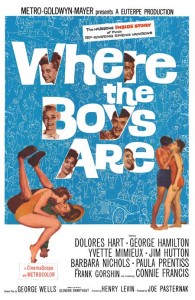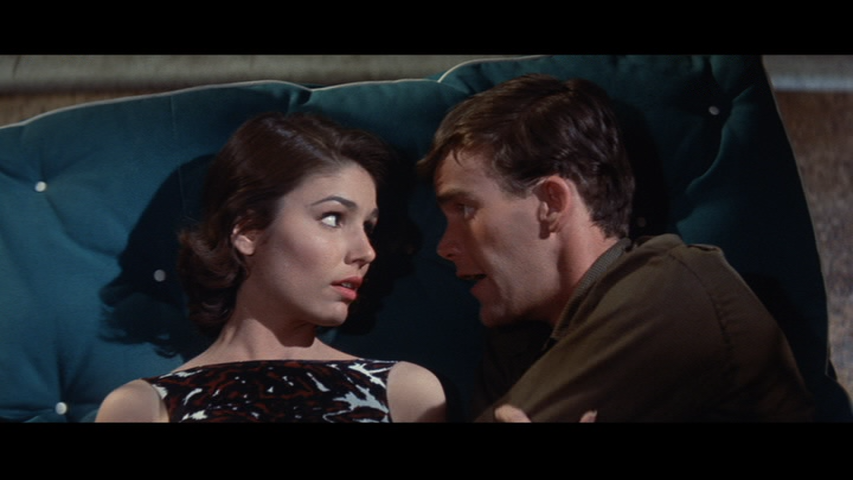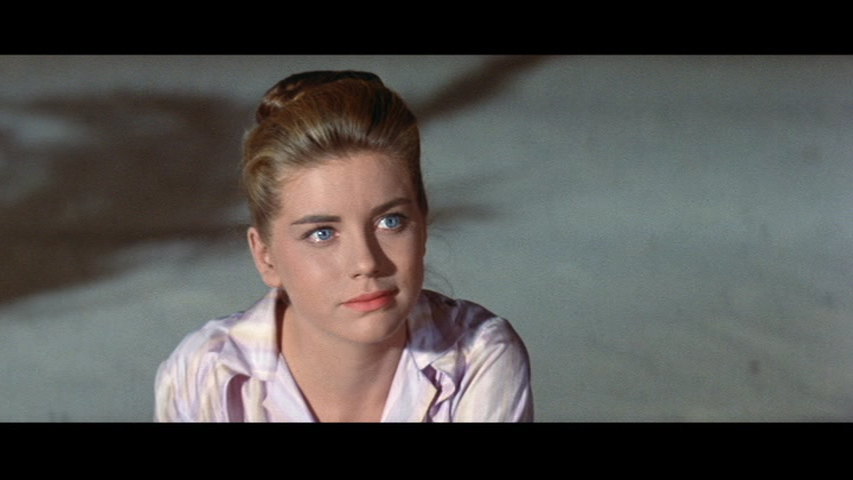Where the Boys Are (1960)
“Experience: that’s what separates the girls from the girl scouts.”
|
Synopsis: |
|
Genres, Themes, Actors, and Directors:
Response to Peary’s Review: In Cult Movies 3, Peary concedes that WTBA shouldn’t really “be taken all that seriously”, given that “any picture about the students who migrate to Spring Break in Fort Lauderdale is bound to be somewhat stupid and junky”. He further points out that one shouldn’t forget “this picture actually has George ‘Mr. Tan’ Hamilton striding across the beach — an image that never fails to delight camp-movie addicts”. However, he argues that the film “is above being enjoyed only on a camp level”, given that “there is much to appreciate” — including “young heroes and heroines” who are portrayed as “caring, smart, and, ultimately, responsible”, and men who “show… respect for the women they’re attracted to”. The exception to this latter statement is, of course, the tragic subplot involving Mimieux’s fatally naive sexual interactions with a group of faux-Yalies — but it’s to the film’s credit that these male characters never emerge as anything other than bit players designed to play slimy louses. As noted above, I don’t quite agree with Peary that all the girls in this film are interested in pursuing sex per se. While they are all sexually curious to one extent or another (who isn’t?), it’s evident that they’re primarily looking for boys to date, to have fun with, and to possibly turn into longer-term mates. Prentiss’s “Tuggle”, for instance, is a self-avowed “good girl” who makes it clear that she’s exclusively interested in finding a man to settle down with: “Girls like me weren’t built to be educated. We were made to have children. That’s my ambition: to be a walking, talking baby factory.” In her screen debut, Prentiss has an appealing comedic presence, and her interactions with lanky Hutton generally ring true. Much less satisfying is the character played by Connie Francis, who nicely sings the title song but otherwise is relegated to a thankless role as the girl desperate to catch a man, any man; she’s too attractive to merit this type of degrading characterization, and I don’t blame her for dismissing the film later in her life as terrible. Note: Where the Boys Are remains of minor historical interest as well simply given that its lead, Dolores Hart, left Hollywood after making this film to become a lifelong Benedictine nun in Connecticut. Redeeming Qualities and Moments: Must See? Categories
Links: |




One thought on “Where the Boys Are (1960)”
Not a must.
While revisiting this, I realized I probably hadn’t seen it since it was shown on tv in the ’60s. It’s not as terrible as my memory seemed to think – but it’s not that memorable either. It does have a certain intelligence to it, particularly in the early scenes – which reveal the ushering in of modern attitudes toward sex. But, as the film moves on, it soon becomes apparent that ‘Where The Boys Are’ should really be called ‘Where The Boy Is’. The film’s message: find that guy to settle down with and find him fast.
I’m not saying that’s a bad message. But it doesn’t make for a very complex film.
‘WTBA’ is certainly a much better film than what followed on the heels of its success – all of the completely mindless beach party movies. But that’s not really saying a lot, ultimately. Considering what the film is, the performances are fine. I just don’t see any real reason to suggest that ffs make a point of seeing it.
Note: Since I was reluctant to rewatch, I turned on the DVD subtitles so I could keep track of the dialogue while listening to the added commentary by Paula Prentiss. It’s certainly nice to listen to her; she’s very engaging and very perky at 65. She doesn’t have a whole lot to say about the film that’s of major interest – but she does speak a lot about the thrill of ‘WTBA’ being her first film, and she has lots of wonderful things to say about just about everybody who worked on it. She also mentions that, although she is aware that she is saying all of these wonderful things about just about everybody, it’s not always possible to talk that way in retrospect about a filming experience.